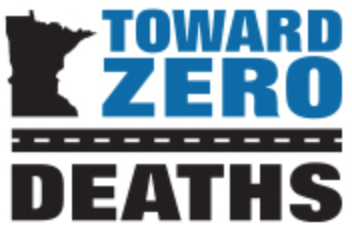2021 Minnesota TZD Webinar Series: Minnesota Walks Safer Together
Thursday, October 14, 2021
About the Webinar
In this webinar, attendees learned about two pedestrian safety initiatives recently completed by the Minnesota Department of Transportation (MnDOT).
First, a presentation provided an overview of "Minnesota Walks," MnDOT's new Statewide Pedestrian System Plan, and gave examples of how local practitioners can use the information from the plan to increase pedestrian safety in their communities.
Then, a second presentation highlighted a MnDOT research project that analyzed pedestrian crashes and systemic risk factors across the state to better understand underlying factors contributing to pedestrian injuries and fatalities. The project team created crash typologies based on pedestrian and motor vehicle locations and roadway contextual factors to examine the prevalence of different crash circumstances. The results of the systemic safety analysis will help identify opportunities for effective countermeasure implementation through scoping, intra-agency collaboration, and other ongoing safety programs.
Webinar Recording & Materials
- Watch the recording
- Piper and Schoner's presentation slides (PDF)
- Rueter's presentation slides (PDF)
- Minnesota Walks web page
- MnDOT's "Pedestrian Crossings and Safety on Four Anishinaabe Reservations in Minnesota" research project page
Speakers
Moderator
Renae Kuehl, Principal Engineer, SRF Consulting
Presenters


Sonja Piper is a pedestrian and bicycle safety engineer with MnDOT’s Office of Traffic Engineering. Her role involves working with MnDOT project managers and local partners to find ways to make Minnesota a safer place for people walking and bicycling along and across state highways. Piper earned her degree in civil engineering from Iowa State University and is a registered professional engineer in Minnesota. She has an over 20-year career working across government agencies and the private sector.
Jessica Schoner is the data science practice lead at Toole Design. Her career is centered at the nexus of transportation planning and data science. In her current role, she translates original research and cutting-edge studies into actionable outcomes and interactive data-driven tools for her clients. She uses GIS and statistics to help federal, state, regional, and local agencies answer critical questions about the effects of infrastructure and the built environment on travel behavior, physical activity, health, and safety outcomes. Schoner's work supports Vision Zero plans, Active Transportation plans, corridor studies, prioritization and evaluation studies, and transit station area planning. She holds master's degrees in urban planning and civil engineering, and a PhD in civil engineering, from the University of Minnesota.

Jake Rueter is a pedestrian and bicycle planner in MnDOT’s Office of Transit and Active Transportation. His work at MnDOT focuses on statewide pedestrian and bicycle planning, primarily in Greater Minnesota. Rueter earned a Masters of Urban Planning and Policy from the University of Illinois at Chicago with a focus on land-use and transportation planning. He and his wife live in the Hamline-Midway neighborhood of Saint Paul, where they care for their miniature bernedoodle, vegetable gardens, and a small flock of urban chickens.
Credit
Attendees are eligible for 1.0 POST credit, 1.25 Professional Development Hours (PDHs), and 1.25 Continuing Legal Education (CLE) credits.
- PDH form (PDF)
- CLE credit form (PDF)
- POST Proof of Completion form (PDF)
This form does not need to be submitted; it is for your records only. - POST Affidavit of Attendance (DOC)
Please submit this form to tzd@umn.edu by March 31, 2022, to receive credit if you watched the webinar live or recorded. If the webinar was viewed with a group, please include all individuals' information. If you choose to fill in the form by hand, please print clearly.
More Information
For more information about the webinar, please contact Linda Dolan at ldolan@umn.edu.
Sponsors
The webinar series was offered by the Minnesota Toward Zero Deaths Program and the Minnesota Departments of Health, Public Safety, and Transportation, with funding from the National Highway Traffic Safety Administration. The series was hosted by the University of Minnesota's Center for Transportation Studies.
Additional sponsorship provided by:

|

|

|

|

|
